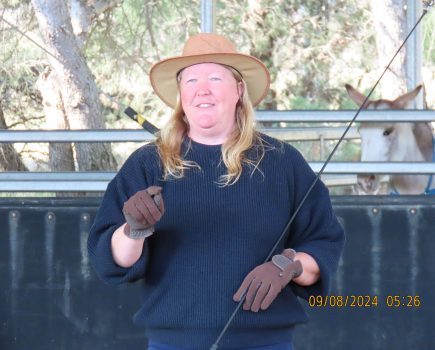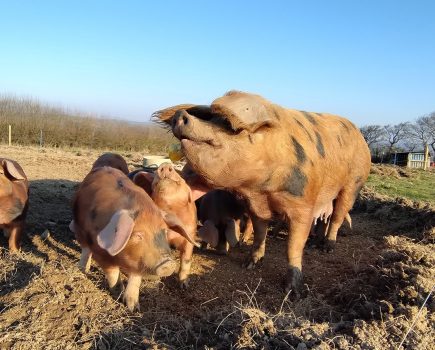Mum Katie Beat offers advice about getting youngsters involved in the ‘good life’

I was lucky enough to grow up on an organic smallholding. It was a stereotypically idyllic country childhood spent climbing trees, fishing, crawling through hedges, making dens, hanging out with the animals and keeping caterpillars as pets. The signal to come back home was when my parents rang a bell – that usually meant food. Other than that we were pretty free to do exactly what we wanted to. At the time, of course, it felt normal. Now it seems to me that this type of childhood is rapidly disappearing. Children do not play outside on their own much anymore. I live on the edge of a small town and it is rare to see kids out on their own, even though it is a relatively safe area. In fact, when I did see a gang of small boys carrying sticks and buckets disappearing over a park wall, it was unusual enough to point out to my husband – ‘Look!’ I said, ‘they’re off on an adventure!’ It makes me terribly sad to think that my daughter will not, in our current living situation, have the kind of freedom that I had as a child.

Nostalgia aside, however, children who grow up on or near a farm or smallholding still have the chance at the unparalleled freedom I enjoyed. Not only this, but the opportunities for learning essential skills are myriad. Even a visit to a farm is incredibly fun, even if it’s just for the day. My daughter, who is three, absolutely loves visiting her grandparents and meeting the animals on their smallholding. She helps out in the garden too and has recently acquired her first boilersuit (essential farmworker wear!). It seems so important to me that children learn practical skills from their parents and grandparents wherever possible and, where it’s not possible, hopefully schools and educational visits can fill the gap.


Children and animals

It’s pretty easy to get children interested in animals! Their natural curiosity usually pulls them in, as long as there is no scare factor involved. It’s easy to involve even very young children in the daily care of animals – especially smaller animals and poultry. Chickens, ducks and most poultry are definitely not scary, they do not barge about too much or make loud noises and, as a bonus, they lay eggs that can be (carefully) collected! It’s possible to keep chickens even in a small urban garden (though cockerels are unpopular in this sort of setting due to early morning noise!) and so bring a bit of the farm to the city.

Bigger animals such as sheep, pigs, cattle and horses can be a bit daunting to smaller children but, if introduced correctly and safely (always with an adult), they will also be big hits.Caring for animals teaches children so many things: responsibility and respect for another living thing, how to interact safely with animals, and where our food comes from, if you can bear to go into detail.
Wash those hands!
Please note children should always wash their hands thoroughly after contact with animals as they do carry germs that can potentially be dangerous. Having said that, contact with a range of bacteria will strengthen your child’s immune system, so there is a payoff as well!
Always bear in mind that children should be supervised when in contact with larger animals. Children move fast and are sometimes unaware of potential hazards. Because they are small, they are more likely to be ‘reprimanded’ by protective animal mothers, who may not like a small human trying to pick their babies up!
Children and gardening
The garden is an area where children can also be involved from a very young age. My three year old is very ‘helpful’ in the garden. She loves digging and watering, harvesting and eating raspberries and strawberries, planting onion sets upside down and picking things she shouldn’t! Whilst gardening with small children can be rather chaotic, if you keep the sessions short and the tasks manageable, everyone enjoys themselves. Allocate an area which ‘belongs’ to the child where they can do whatever they like (digging, messing about and growing easy crops for younger ones, planting things of their choice for older children). That way they can have fun without fear of disturbing your own precious crops. Encourage them to grow things they like to eat so they have the pleasure of growing, harvesting and eating something from ‘their’ garden. Participating in the growing process can help overcome food fussiness, particularly for things like peas. There is just no comparison between school dinner peas (green tasteless mush) and a pod of raw freshly podded peas straight out of the garden. They suddenly start disappearing like sweets! My daughter refused to have anything to do with a pea until she helped us harvest and pod peas last summer! She is certainly more willing to try things that have come out of the garden, especially if she has helped grow or pick it.
Other activities which can enthuse little ones are growing sunflowers (have a competition to see who can grow the tallest one) and pumpkins (for carving at Halloween). Some children may enjoy slug and snail hunting (and squashing or ‘rehoming’ them!). It’s also nice to refer to characters from fiction like Peter Rabbit, and talk about Mr McGregor’s garden and the kind of things Peter likes to nibble in the garden.
If you know of other families who grow their own, you could arrange an inter-familial competition culminating in some sort of prize-giving, vegetable eating party! Children love doing things with their friends, so if you can involve others, so much the better. Many schools have embraced the notion of vegetable gardening, so it may be worth speaking to your children’s school and seeing what they are doing – perhaps they need parent helpers, maybe they don’t know what to do and you/your kids could help out. Some schools may participate in educational visits to farms or smallholdings through Educational Access schemes (as profiled recently by Alan Beat). Smallholding associations may also offer an informal way to visit other farms through their monthly meetings.
Animals and farm management
If you do live on a farm or smallholding, encourage your children to participate in the day-to-day running of things. Younger children will often automatically be interested in ‘helping’ – usually in the things you want to do on your own! Whilst some children are naturally resistant to ‘work’ and may be reluctant to help with ‘boring’ tasks, they may be encouraged if there is a reward at the end. This may be something simple like they get to choose a treat or activity to do with you, or may be monetary – it could be a way to earn pocket money. Even better – give them responsibility for something – but they get the profits or a share of the profits. I remember helping my dad raise ducklings one year, feeding and watering every morning and evening, and helping with some very smelly mucking out! But it was wonderful when we sold them and I received my share of the profit!
Older children may be trustworthy enough to ‘own’ and look after livestock, obviously with adult guidance. I spent most of my childhood saving up to buy a horse, but I never quite managed to amass enough money. In the end I bought a mountain bike which enabled me to ride around to see my friends and was a lot cheaper to feed! Learning about the cost of raising animals and the likely profit if you sell them, is a brilliant lesson in finance, profit and loss.
Nature walks
Not all of us are lucky enough to live on a farm or have everyday contact with farm animals. Even if you live in the smoke, though, you can make sure your children come into contact with nature in all its muddy glory. Take them to a nature reserve or forest, river or stream, city farm, allotment or community agriculture scheme. Let them get muddy, wet, sandy or messy. Let them hold and stroke animals and talk to them as much as possible about natural processes (where milk and meat comes from, how lifecycles happen etc). My mum recently took my daughter Alice on a frog hunting walk around the lake on their farm. They hunted through the long grass for baby frogs and found a few and also a host of other little bugs and creepy crawlies. Alice was full of her ‘adventure’ and had a really lovely time.
It’s pretty easy to buy or borrow books which help you to identify the plants and wildlife you can see around you. Participate in bird and butterfly surveys – it is amazing how much diversity is sitting around, right under your nose. Build insect hotels and don’t be too tidy in the garden and you will encourage hedgehogs and all sorts of other wildlife to live with you. If you are technically minded you could even set up motion detector cameras in your garden or fields to monitor what comes along when you are not around.
Try going and staying on a farm for your holidays! Or sign up with WWOOF (www.wwoof.org.uk) and work on an organic farm for a few days.
Profile: Kim Stoddart and family
I have two young boys Alberto (8) and Arthur (6) and, although fairly close in age, like most siblings they have different interests and ideas about what they want to be doing. Also my youngest son is autistic so we have to be careful that whatever we’re doing is going to be safe and appropriate for him.
Being boys, tractors, diggers, quad bikes and the like are always going to be of interest. We don’t have any ourselves but we do a lot of collaborative work with one of our neighbours in particular and the boys get involved helping out knowing that there’s a quad bike ride in it for them at the end. Positive reward (aka bribery) always works a treat.
My youngest son has a real interest in gardening, especially in the picking and eating of a wide range of fruit and vegetables, whereas my eldest has been given ownership of a little veg patch of his own to help nurture a desire to get involved. A rope swing and play area we’re created at the back of the garden has helped and also getting them involved, asking them what they’d like to help out with and do, makes the experience more inclusive and therefore enjoyable for all concerned.
Kim Stoddart is a regular contributor to Country Smallholding magazine and blogs at www.getbadlybehaved.com
Image(s) provided by:
Archant
Archant
Archant
Archant
Archant
Archant







